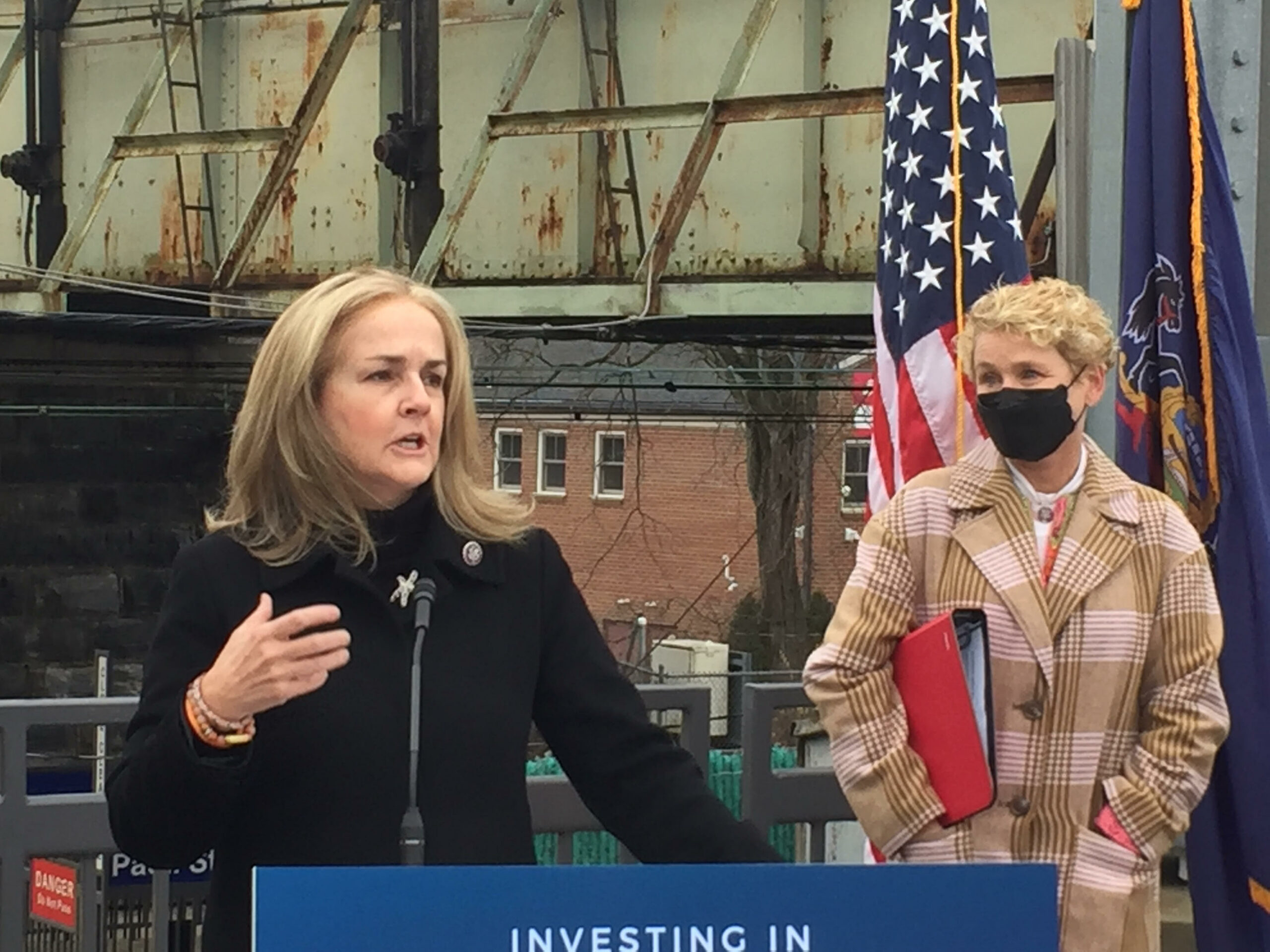DelVal Dems Tout Infrastructure Spending, Dismiss Impact on Inflation

Delaware Valley U.S. Reps. Chrissy Houlahan (D-Chester) and Madeleine Dean (D-Montgomery) are celebrating the billions of federal dollars the new bipartisan infrastructure bill will bring to Pennsylvania. And they reject the argument that trillions in new federal spending will add to the nation’s rising inflation problems.
“This [spending] is the answer to that problem,” Houlahan said.
The two Democrats held a press conference with local officials at the Paoli Train station on Saturday to tout the $1.2 trillion Infrastructure Investment and Jobs Act, now signed into law.
“As a former teacher and engineer, I’m a particularly grade and data-driven person,” said Houlahan. “Pennsylvania now has a grade of C minus for roads and bridges and a grade of D for inlands waterways, according to the American Society of Civil Engineers report card, she said. “And those grades are simply unacceptable. And the data show that must change and we must make changes for safety and for a better way of life.”
The IIJ Act, sometimes referred to as the “bipartisan infrastructure bill,” will provide $11 billion for highways in Pennsylvania; $1.6 billion for bridge replacement and repairs over the next five years; $2.8 for the Amtrak corridor that serves the Delaware Valley region; and $5 billion in grants for rail safety.
“These historic investments will transform our nation and this region so we can better meet the demands of the 21st century with upgraded roads, bridges, modernized transportation, clean drinking water and reliable internet access,” said Dean. The act includes $18 billion for the commonwealth, she said. There is also $244 million to help low income families with weatherizing their homes and $355 million for airport improvements.
And, Houlahan added, the funding will help area communities “ravaged” by flooding from Hurricane Ida last summer. The act provides money to rebuild, along with mitigation to prevent future flooding.
Polling shows Americans in general and Pennsylvanians in particular are more worried about rising inflation than they are the state of roads and rail. The Consumer Price Index reached a 6.8 percent annual rate in November, the highest since June 1982. Just days before Saturday’s presser, the Producer Price Index numbers were released “showing the biggest annual gain since the series was revamped 11 years ago,” according to Reuters.
Asked about the impact of this spending on inflation, Houlahan denied there was a problem.
“Well, I think this is actually the exact opposite of that concern,” she said. “We have an issue with inflation right now and we need to be attentive to it. But we also have an issue where we need to be creating jobs and opportunity for people. Where we need to be able to provide pathways literal and figuratively to be able to create those jobs and opportunities to be able to expand…This is the answer to that problem.”
Polls show most Americans don’t agree. A new Fox Business poll released last week found 47 percent of Americans believe the Biden administration’s policies are “hurting” the country’s ability to fight inflation. And 46 percent say the Build Back Better social spending bill Dean and Houlahan helped pass last month will just drive inflation even higher.
DVJournal also asked about the infrastructure bill’s spending on electric vehicles (EVs), whose production is reliant on rare earth metals like lithium and cobalt. China is the dominant processer of these elements and, critics say, would overwhelmingly benefit from spending on green tech like EVs.
Houlahan said that as a former chemistry teacher, “I geek out on the periodic table and I serve on the armed services committee and actually passed a lot of legislation on rare earth elements.”
She called the term “rare earth” a “misnomer,” saying those minerals are everywhere but “China, amongst others, has a pretty big corner on the market on those processes and that mining, because it is also a very dirty process. And this is something understandably that here in the United States, we are more reticent to do. We do have a lot of work that needs to be done on rare earth elements. We need to become less reliant on China.”
Houlahan said she plans a trip to Australia, Japan, and South Korea to investigate how those countries deal with China and are able to “to diversify their reliance on rare earth elements and their reliance on China. That being said, we can’t walk away from the importance of electric vehicles.”
State Secretary of Transportation Yassmin Gramian, who attended the press conference, discussed how the increase in electric vehicles has decreased the state’s revenue from the gasoline taxes that funds road and bridge repairs.
Gramian said the new act provides the largest amount of funds earmarked for transportation since the Eisenhower administration.
“We have unmet needs of $8.1 billion annually in our highway and bridge program,” said Gramian. “And $9.3 billion altogether for all modes of transportation,” Gramian said. “We are so excited to see more electric vehicles on the road, we are so excited to see that the cars are becoming efficient…But that has really, truly impacted the revenue that’s been generated for our transportation system.
“Seventy-eight percent of our revenue for highways and bridges comes from gas taxes and it’s been going down month after month to the tune of $15 to $10 million. Last year around this time, we came very close to shutting down our transportation projects. We were down in our revenue by $600 million. We did not have enough cash to pay for our construction projects and pay our bills. That’s how bad the situation was at PennDOT because we are so much relying on gas taxes.”
Follow us on social media: Twitter: @DV_Journal or Facebook.com/DelawareValleyJournal


